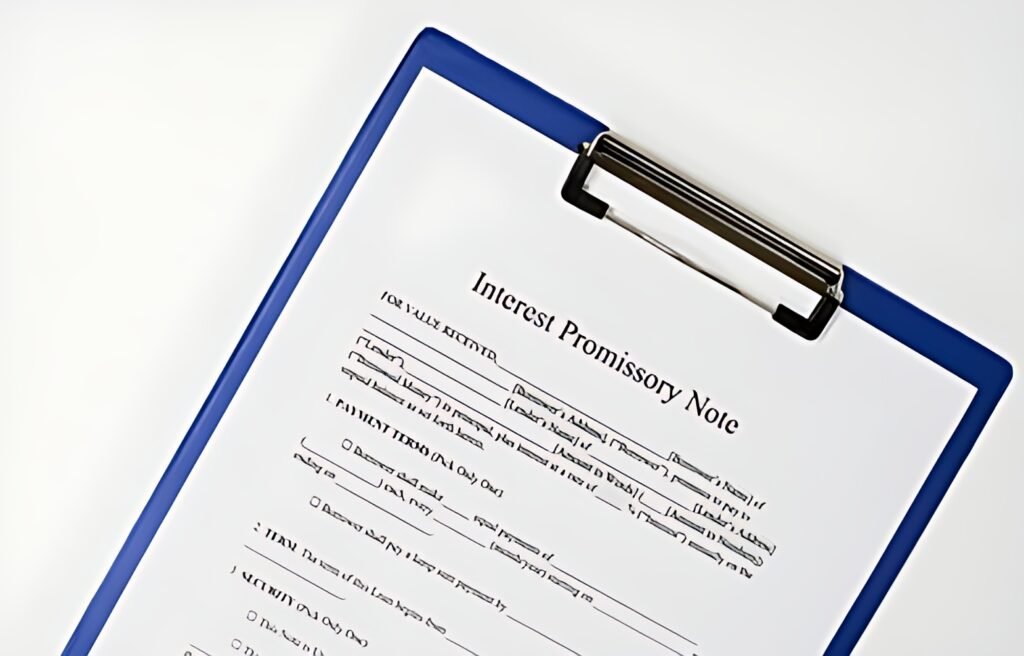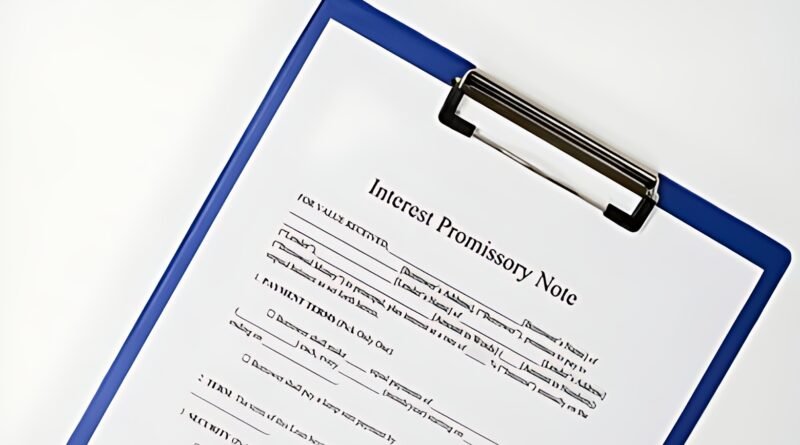Understanding about the Promissory Note Definition in Banking
At some point in our lives, we may require financial assistance from a bank. When we approach a bank for a loan, a promissory note may be part of the loan agreement. If you are not familiar with a promissory note, you may be wondering what it is and what its significance is in banking. Let us delve into the meaning and definition of a promissory note in the context of banking.
A promissory note is a legal document between a borrower and a lender, in which the borrower promises to repay the loan amount to the lender on a specified date or on demand. The promissory note contains the terms and conditions of the loan, including the interest rate, repayment schedule, and penalties for late payment or default. The promissory note serves as evidence of debt and is legally binding.
Table of Contents
Understanding the promissory note definition in banking is essential if you are planning to take out a loan or if you are a lender. By understanding its purpose, significance, and how it functions within the banking system, you can make informed decisions and protect your interests.
Key Takeaways
- A promissory note is a legal document between a borrower and a lender in which the borrower promises to repay the loan amount.
- The promissory note contains the terms and conditions of the loan, including the interest rate, repayment schedule, and penalties for late payment or default.
- The promissory note serves as evidence of debt and is legally binding.
What is a Promissory Note?
In the world of banking and finance, a promissory note is a legal document that serves as a written promise from one party (the issuer) to pay a certain amount of money to another party (the payee) at a specified time in the future. It is also known as a “IOU” or “note payable”.
More specifically, promissory notes outline the terms and conditions of a loan, including the amount borrowed, the interest rate, the repayment schedule, and any penalties for non-payment. They are commonly used in a variety of financial transactions, ranging from personal loans between friends and family members to large-scale commercial ventures.
Promissory notes have legal implications, meaning that they can be enforced in court if the issuer fails to pay as promised. They are therefore a crucial aspect of business and financial relationships, as they provide a written record of the terms and conditions of a loan.
“A promissory note is a written commitment from one party to pay another party a specified sum of money at a future date or on demand.”
Promissory Note Definition and Examples
Before diving into how promissory notes work in banking, let’s first define what a promissory note is. Simply put, a promissory note is a written document that promises to pay a specific amount of money to a person or entity on a specified date or on-demand.
Here’s an example:
“I, John Doe, promise to pay Jane Smith the sum of $5,000 on August 1st, 2022.”
This written promise is a promissory note.
Promissory notes can take many forms and can be used for various purposes. Here are some common examples:
| Type of Promissory Note | Purpose | Example |
|---|---|---|
| Personal promissory note | Used for personal loans between friends or family members | “I, John Doe, promise to pay Jane Smith the sum of $5,000 within six months.” |
| Commercial promissory note | Used in business transactions | “I, John Doe, promise to pay ABC Corporation the sum of $10,000 on July 1st, 2022.” |
| Mortgage promissory note | Used in the purchase of real estate | “I, John Doe, promise to pay XYZ Bank the sum of $200,000 with interest over a period of 30 years.” |
As you can see, promissory notes can vary in terms of the amount of money being promised, the date of payment, and the purpose of the note itself. It’s important to note that promissory notes are legally binding documents and should be taken seriously.
How Promissory Notes Work in Banking
Understanding the finer details of promissory notes in the banking sector is crucial for all parties involved. A promissory note acts as a written promise to pay a specific amount of money to someone within a specific timeframe. It is commonly used by banks when lenders loan money to borrowers.
When borrowers apply for a loan from a bank, they typically sign a promissory note. This document outlines the terms and conditions of the loan, including the loan amount, interest rate, repayment schedule, and consequences of default. The promissory note serves as evidence of the borrower’s promise to repay the loan.

Understanding Promissory Notes from Banks
When it comes to promissory notes from banks, the terms and conditions can vary widely. Some common issues to consider when reviewing a bank promissory note include:
- The loan amount
- The interest rate
- The repayment schedule
- Whether the loan is secured or unsecured
- Any fees associated with the loan
- The consequences of default
It’s important to review these terms and conditions carefully before signing a promissory note from a bank. In most cases, borrowers will have limited bargaining power, so it’s essential to fully understand the terms of the loan before accepting it.
Promissory Note Terms and Conditions in a Bank
As mentioned, the terms and conditions of a bank promissory note can vary from one loan to another. Here are some key terms and conditions that borrowers should be aware of:
| Promissory Note Term | Description |
|---|---|
| Principal amount | This is the amount of money the borrower is borrowing from the bank. |
| Interest rate | The rate at which the borrower will be charged interest on the loan. |
| Repayment schedule | The timeline for repaying the loan, including the number of installments and the amount due at each payment. |
| Credit score | Borrowers’ credit score is often used to determine the interest rate and other terms of the loan. |
| Collateral | Some loans require collateral, which is an asset or property that the borrower pledges to the lender as security for the loan. |
| Default | If the borrower fails to repay the loan, the lender may pursue legal action to recover the money. This can include seizing assets or filing a lawsuit against the borrower. |
By understanding these terms and conditions, borrowers can make informed decisions about whether to accept a bank’s loan offer. It’s essential to read the promissory note carefully and seek legal advice if necessary before signing.
Overall, promissory notes are an essential part of the banking sector, providing a written promise by borrowers to repay loans under specific terms and conditions. Understanding how they work and their significance in the banking industry is crucial for all parties involved.
Explaining Promissory Notes from Banks in Simple Terms
At their core, promissory notes are straightforward financial instruments used to facilitate lending and borrowing between parties. However, the legal complexities and financial jargon often used in promissory notes can make them difficult to understand.
Simply put, when a bank issues a promissory note, they are promising to repay a loan from the borrower. The borrower agrees to repay the loan on a specified schedule with interest, and the bank agrees to lend the money under those terms. The promissory note serves as a legally binding agreement between the two parties.
The terms of a promissory note can vary widely depending on the specifics of the loan and the agreement between the borrower and the bank. However, some key terms that are commonly included in promissory notes include:
- The principal amount of the loan
- The interest rate and repayment schedule
- The consequences of defaulting on the loan
- Any collateral or security that is required to secure the loan
It’s important to note that promissory notes are legal documents, and borrowers should fully understand the terms and conditions before signing. If there are any questions or concerns, borrowers should consult with a financial advisor or legal professional.

“By signing a promissory note, you are agreeing to repay the loan on the specified terms. It’s vital to fully understand the agreement and seek advice if needed.”
In summary, promissory notes are a common way for banks to lend money to borrowers. Although the language used in these agreements can be complex, understanding the terms and conditions is critical for both parties. By working with a financial advisor or legal professional, borrowers can ensure that they fully understand the terms of a promissory note and make informed decisions when borrowing money from a bank.
Conclusion
Throughout this article, we have discussed the significance and function of promissory notes, particularly in the context of banking. As we have seen, a promissory note is a legally binding document that outlines the terms and conditions of a loan. It is an important tool for both borrowers and lenders, providing clarity and protection.
Promissory Note Types
There are various types of promissory notes, each with different terms and conditions. These include demand promissory notes, installment promissory notes, and unsecured promissory notes. It is important to understand the type of promissory note being used to ensure compliance with its terms and conditions.
Bank Loan Promissory Note
In the banking sector, a promissory note is often used to document loans. Banks issue promissory notes to borrowers, outlining the terms of the loan, including the amount, interest rate, and repayment schedule. It is important for borrowers to understand the terms and conditions of a bank loan promissory note before signing it.
Promissory Note Basics
Regardless of the type of promissory note, there are basic elements that should be included in its content. These include the names and addresses of the borrower and lender, the amount borrowed, the interest rate, and the repayment terms. Understanding these key elements is crucial to ensuring compliance with the terms of the promissory note.
In conclusion, understanding the concept of a promissory note in the context of banking is essential. Whether you are a borrower or a lender, a clear understanding of the terms and conditions outlined in a promissory note can help protect your interests and facilitate smoother financial transactions.
What is a promissory note?
A promissory note is a legal document that outlines a borrower’s promise to repay a specific amount of money to a lender according to agreed-upon terms. It serves as evidence of the borrower’s debt and contains details such as the loan amount, repayment schedule, and interest rate.
Why are promissory notes important in banking?
Promissory notes play a crucial role in banking as they establish a contractual agreement between the borrower and the lender. They provide legal protection to both parties and ensure that the terms of the loan are clearly defined. Additionally, promissory notes help facilitate smooth financial transactions and provide a record of the debt.
What are some common features of a promissory note?
Promissory notes typically include essential details such as the names of the borrower and lender, the loan amount, the interest rate, the repayment schedule, and any applicable fees or penalties. They may also contain provisions regarding default, late payments, and the consequences of non-repayment.
Can a promissory note be modified or canceled?
Yes, a promissory note can be modified or canceled if both parties agree to the changes and document them in writing. However, any modifications or cancellations should be carefully reviewed and ideally, legal advice should be sought to ensure compliance with applicable laws and regulations.
Are promissory notes enforceable by law?
Yes, promissory notes are legally enforceable documents. If the borrower fails to repay the loan according to the terms stated in the promissory note, the lender has the right to take legal action to recover the outstanding debt. The promissory note serves as evidence of the borrower’s obligation to repay the loan.
Are promissory notes transferable?
Yes, promissory notes can be transferred from one party to another through a process called assignment. The lender can assign their rights to the note to someone else, allowing that person to legally collect the debt from the borrower. However, certain restrictions or conditions may apply, depending on the specific terms of the promissory note and applicable laws.
What happens if a borrower defaults on a promissory note?
If a borrower defaults on a promissory note by failing to repay the loan as agreed, the lender may take legal action to recover the outstanding amount. This can involve filing a lawsuit, obtaining a judgment, and potentially pursuing collection efforts such as wage garnishment or placing a lien on the borrower’s assets.




